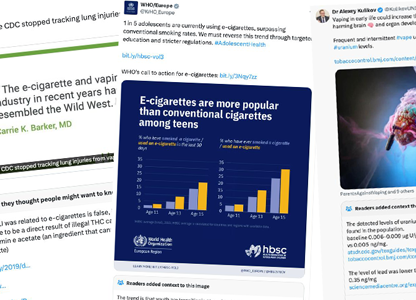Vapes should be endorsed in World Health Organisation (WHO) legislation for their crucial role in helping people to quit smoking, a new report argues.
The article in scientific journal The Lancet – published ahead of crunch COP10 talks next week – calls on the WHO to recognise the central part vapes and similar products can play in reducing tobacco use.
Global leaders are set to meet in Panama from February 5 to 9 to discuss the WHO Framework Convention on Tobacco Control (FCTC) – an international treaty created to combat the “tobacco epidemic.”
Background papers for COP10 recommend that the FCTC be amended to crackdown on vapes and other novel nicotine products, so they are regulated in the same way as tobacco.
But the article, written by public health and tobacco policy veterans Robert Beaglehole and Ruth Bonita, argues that this would be a backward step.
It says: “There is no scientific justification for WHO’s position that e-cigarettes and other novel nicotine products should be treated in the same way as tobacco products.
“This approach is a retrograde step because they are not comparable products in terms of the damage they cause; after all, it is the burning of tobacco that causes harm, not nicotine.
“The focus must remain on the central public health problem—the damaging health effects of tobacco consumption. Reducing cigarette smoking is the most effective way to prevent tobacco-related deaths and tobacco harm reduction is the fastest and fairest way to lower smoking prevalence.”
Beaglehole and Bonita – both former WHO senior officials and now professors at University of Auckland – say the legislation should instead support countries to include vapes as part of an effective strategy to reduce smoking.
They write: “We believe WHO needs to provide positive leadership and technical support to countries as they consider the use of e-cigarettes and other nicotine delivery devices, including snus, pouches, and heated and smokeless tobacco.”
The article says that while vaping may not be risk-free – especially for non-smokers – the risks of long-term harm are “likely to be low, especially when compared with the drainage caused by smoked tobacco.”
And addressing concerns about vaping by children, it says: “There is little evidence to suggest that vaping leads to smoking among youth, and although the proportion of non-smoking youth who vape is increasing, it remains at a fairly low level.
“Stricter regulations, including enforcing sales restrictions, and appropriate health-promoting campaigns are needed to prevent vaping by young people, but these measures must be balanced with the health needs of older adults who smoke and require support to quit.”
Some countries, the article points out, have seen substantial reductions in smoking as more people have taken up e-cigarettes, or vapes.
It reports that in New Zealand, the prevalence of adult daily smoking dropped from 13.3 per cent in the year to 2018, to 6.8 per cent in the year to 2023 – a 49 per cent decline in five years. This coincided with e-cigarettes having become widely available. In the same period, adult daily vaping rose from 2.6 per cent to 9.7 per cent.
The article says: “New Zealand’s recent decline in smoking occurred in the absence of any other major tobacco control policy, apart from the annual cost-of-living price increases.
“The decrease in smoking during this period in New Zealand shows what can be achieved and exceeds the WHO smoking prevalence reduction goals of 30 per cent over 15 years from 2010 to 2025.”
The authors add that Sweden, with a long tradition of Snus use, has the lowest rate of adult daily smoking in the world and a low death rate from tobacco-related diseases. They say that Norway, England and Japan have seen similar successes to coincide with the uptake of vapes.
“WHO needs to embrace these innovations in nicotine delivery,” the article concludes. “Countries that are reaping the benefit of tobacco harm reduction, such as New Zealand, Sweden, Norway, England, and Japan, should encourage participating countries at COP10 to support proposals that will quickly reduce smoking rates.
“The world’s 1.3 billion people who smoke, half of whom will die early, deserve this leadership.”



